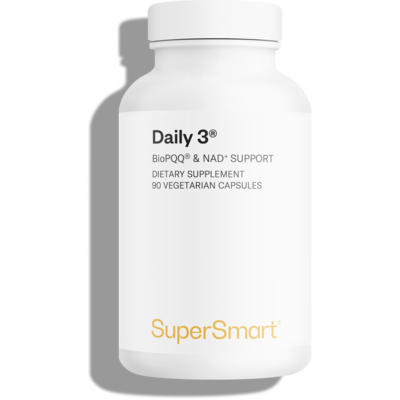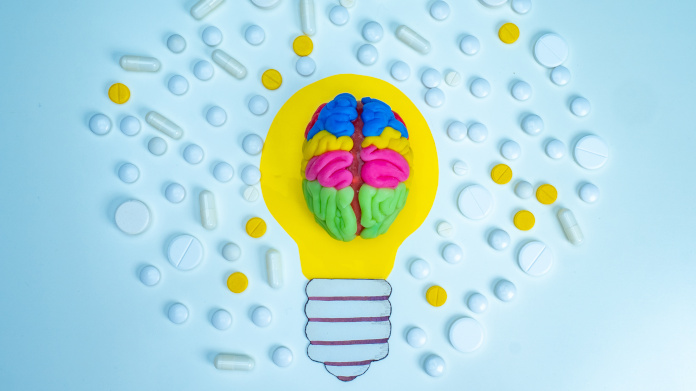Clinical study: do multivitamins slow cognitive decline?
Many scientists are looking to halt age-related cognitive decline. The COSMOS study looked at the impact of multivitamin and mineral supplementation on cognition. Find out more about the results of this large-scale study.

A large-scale study of the effects of multivitamins/multiminerals on cognitive function
Principle of the COSMOS multivitamin study
The COSMOS (COcoa Supplement and Multivitamin Outcomes Study) is a randomised, double-blind, placebo-controlled clinical trial involving 21,442 adults, published in March 2024 in The American Journal of Clinical Nutrition.
This large-scale study examines the effect of cocoa flavanol supplements and multivitamin supplements on several aspects of the health of older adults, including cardiovascular disease, cancer and cognitive function (1).
Within this vast COSMOS study, a meta-analysis combined the results of three sub-studies called COSMOS-Clinic, COSMOS-Mind and COSMOS-Web, which evaluated the effects of multivitamins on cognition.
Improved brain performance following multivitamin intake?
The COSMOS-Clinic sub-study was conducted on 573 people aged over 60.
It observed certain benefits in people taking a multivitamin supplement compared with those taking a placebo, in terms of overall cognition.
According to this sub-study, the difference proved to be particularly significant in terms of episodic memory, which refers to the ability to remember past events by linking them to their context.
The meta-analysis of the various sub-studies also showed clear evidence of these same benefits in the context of daily multivitamin and mineral supplementation over 2 years.
The tests carried out determined that the difference observed in overall cognition would be equivalent to a reduction in cognitive aging of around 2 years.
The results of the COSMOS study therefore confirm the benefits of this type of supplementation in preventing cognitive decline in the elderly.
The benefits of vitamins and minerals for cognitive health
Vitamins and minerals are known to play an essential role in maintaining numerous physiological functions, including cognitive health (2).
More specifically, the nutrients that play a decisive role in cognitive function are:
- iodine and zinc, because they contribute to normal cognitive function;
- vitamins B1, B2, B3, B6, B12 and C, along with biotin, magnesium, potassium and iodine, because they contribute to the normal functioning of the nervous system;
- vitamin B5, which contributes to normal mental performance;
- vitamins B1, B3, B6, B9, B12 and C, along with biotin and magnesium, because they contribute to normal psychological function;
- vitamins B2, B3, B6 and C, as well as magnesium, because they help reduce fatigue; and
- vitamins B2, C and E, along with zinc and selenium, which help protect cells against oxidative stress.
Why take a multivitamin to combat cognitive decline?
Cognitive aging, deficiencies and supplements
Age-related cognitive decline is the result of a number of factors, including oxidative stress, inflammation, reduced neurotransmitters, reduced cerebral blood flow, loss of synaptic plasticity, accumulation of toxic proteins, and so on.
Vitamins and minerals in the diet help to combat this phenomenon.
However, aging is generally accompanied by a reduction in the intestinal absorption of nutrients, or even less effective cellular utilisation, which may require higher intakes of vitamins and minerals, particularly through supplementation.
The high vitamin and mineral intake provided by a quality food supplement (such as Daily 3®) helps to compensate for the deficiencies caused by aging.
This helps to reduce oxidative stress, modulate inflammation, support cellular energy and protect neurons, thereby helping to preserve cognitive functions such as memory.
Other nutrients and compounds of interest for the brain
Some multivitamins may contain other nutrients of interest for brain health, in particular antioxidant compounds - in addition to vitamin B2, vitamin C, zinc and selenium, which are themselves antioxidants.
Examples of antioxidants include anthocyanidins in bilberry extract, proanthocyanidins in pine bark extract, polyphenols in green tea or grape seed extracts, oleuropein in olive extract, etc. (all these phytonutrients are found in Daily 3® multivitamin, in addition to the vitamins and minerals mentioned above) (3).
Some multivitamins even supplement this arsenal with valuable compounds such as:
- BioPQQ®, a qualitative form of pyrroloquinoline quinone, which is thought to act on mitochondrial biogenesis and protect neurons from oxidation;
- nicotinamide riboside, a precursor of NAD+, which supports cellular energy and neuroprotection; and
- quercetin, a general soothing agent believed to prevent cognitive decline. (Once again, they are all present in Daily 3®).
So, for more complete coverage of your needs, you should ideally turn to multivitamin formulas that include not only the targeted vitamins and minerals, but also antioxidant compounds and/or compounds of interest for cognition and general health (this is true of our flagship multivitamin Daily 3®, the most complete and highest dose on the market).
SUPERSMART ADVICE
References
- Vyas CM, Manson JE, Sesso HD, Cook NR, Rist PM, Weinberg A, Moorthy MV, Baker LD, Espeland MA, Yeung LK, Brickman AM, Okereke OI. Effect of multivitamin-mineral supplementation versus placebo on cognitive function: results from the clinic subcohort of the COcoa Supplement and Multivitamin Outcomes Study (COSMOS) randomized clinical trial and meta-analysis of 3 cognitive studies within COSMOS. Am J Clin Nutr. 2024 Mar;119(3):692-701. doi: 10.1016/j.ajcnut.2023.12.011. Epub 2024 Jan 18. PMID: 38244989; PMCID: PMC11103094.
- Rutjes AW, Denton DA, Di Nisio M, Chong LY, Abraham RP, Al-Assaf AS, Anderson JL, Malik MA, Vernooij RW, Martínez G, Tabet N, McCleery J. Vitamin and mineral supplementation for maintaining cognitive function in cognitively healthy people in mid and late life. Cochrane Database Syst Rev. 2018 Dec 17;12(12):CD011906. doi: 10.1002/14651858.CD011906.pub2. PMID: 30556597; PMCID: PMC6353240.
- Nazzi C, Avenanti A, Battaglia S. The Involvement of Antioxidants in Cognitive Decline and Neurodegeneration: Mens Sana in Corpore Sano. Antioxidants (Basel). 2024 Jun 7;13(6):701. doi: 10.3390/antiox13060701. PMID: 38929140; PMCID: PMC11200558.
Keywords
23 Days
Easy to navigate site
Easy to navigate site, had what I was searching for, good price. easy order-check out
James Tucker
29 Days
My skin is clearing up nicely!
Pretty good for my skin so far.
Christian
31 Days
The new packaging is excellent
The new packaging is excellent - finally! No more squashed boxes and torn envelopes.
GORAN
32 Days
Great Product
Great Product
Larry Garrett
36 Days
Quick shipping
Quick shipping; good price. No issues!
Mary McCarty
38 Days
Thr product is very good and is helping…
Thr product is very good and is helping me on my health. Then is always on time
LUGO Luz
40 Days
Buying was fine
Buying was fine. I had problems with the website not recognizing my login info, and had to call to get it fixed. Other than that, everything was good.
David S. Clark
41 Days
Your super maca and super ginseng are…phenomenal
Your super maca and super ginseng are phenomenal supplements that compliment each other when taking them together. Fantastic feeling of well-being and lots of mid day energy without the crash.
Keith Mason
43 Days
I have had amazing results with every…
I have had amazing results with every supplement I've purchased. I am extremely satisfied with this company
kirstin Torres
43 Days
Fine products
Fine products . They are on the leading edge of online supplements. The only issue -so far-is they sometime run out of subscription items.
Jason Argos
46 Days
The ordering process is very user…
The ordering process is very user friendly and the products always come in a timely manner.
CARTER Rhonda
47 Days
The price for Dr
The price for Dr. Pero's AC-11 is reasonable and in line with his views. (my former colleague). Keep it pure.
CAMPBELL Clayton
50 Days
Right on every time.
Right on every time.
Arthur Nicholas
53 Days
They are cheaper than everyone else and…
They are cheaper than everyone else and the shipping was fast. Great company.
Patricia Adams
59 Days
Availability of quality health…
Availability of quality health supplements and it's wide variety is impressive. Ordering is seamless and shipping even during the holidays is well streamlined.
Mohamad Hussein





